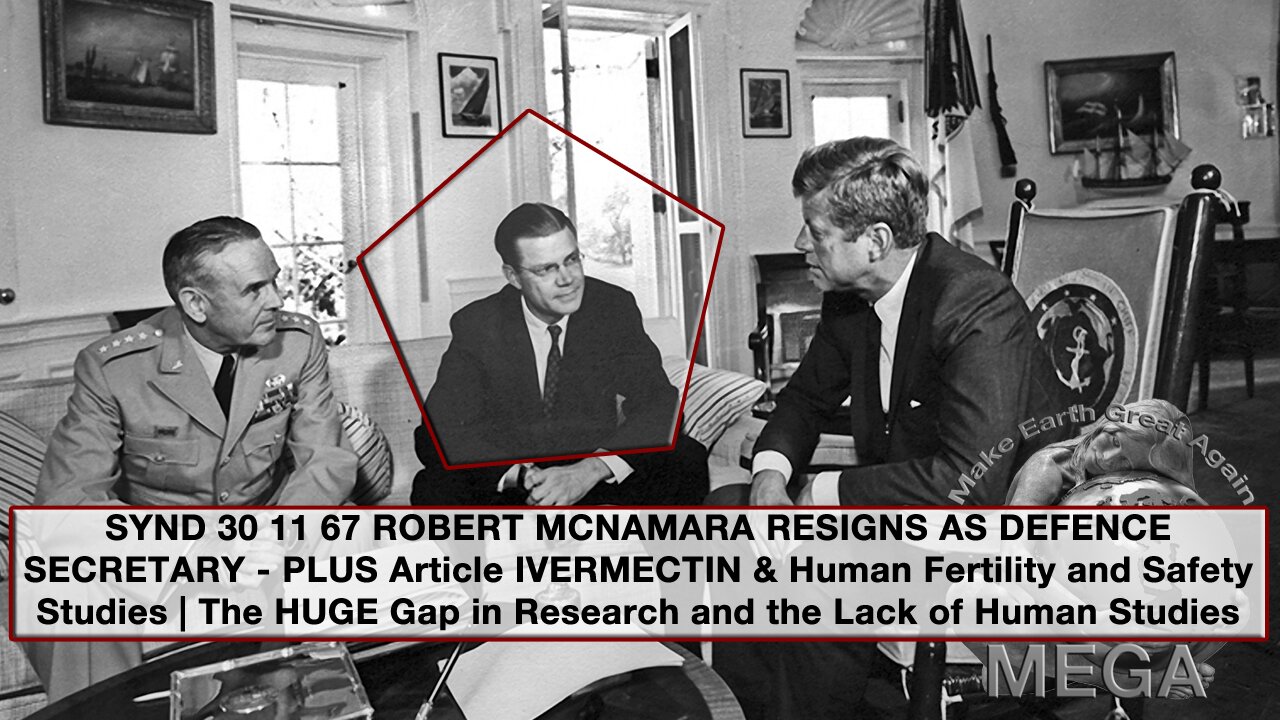Premium Only Content

SYND 30 11 67 ROBERT MCNAMARA RESIGNS AS DEFENCE SECRETARY - PLUS Article IVERMECTIN & Human Fertility and Safety Studies | The HUGE Gap in Research and the Lack of Human Studies
Ivermectin, a drug long used to treat parasitic infections, has recently become a topic of heated debate. Promoted by so-called freedom-fighting physicians and others, ivermectin has been touted as a miracle prophylactic or cure for COVID-19, despite ongoing debates about what COVID-19 truly is. Amidst this controversy, many people have taken matters into their own hands, self-dosing with ivermectin on a regular and continued basis. This widespread self-administration raises significant concerns, especially given the lack of comprehensive research into ivermectin's long-term effects, including its impact on fertility. What’s even more troubling is that this medication, pushed by pharmaceutical giant Merck and endorsed by organizations like the World Bank, is classified as an insecticides, pesticides and larvicide, raising further questions about its safety.
In the early 1970s, onchocerciasis, or river blindness, was supposedly rampant in 34 countries, primarily in Africa. It was the O.G. COVID-19, Monkey Pox, Avian Flu, the sky is falling scenario we see endlessly and daily contemporarily. With approximately 17.7 million people infected globally, including 270,000 blind and 500,000 severely visually impaired, the supposed “river blindness” disease of the 70s had a devastating impact on health, economic productivity, and agriculture, especially in sub-Saharan Africa.
By 1973, Robert McNamara, then President of the World Bank, deemed onchocerciasis as a major crisis. In 1974, the World Bank, along with other UN agencies, launched the Onchocerciasis Control Programme (OCP) in West Africa. The program aimed to address the disease across 1.2 million square kilometers, protecting 30 million people from river blindness. Did you catch that? The whole they sprayed stuff in the water part? Finish the job?
For over a decade, the OCP’s control efforts relied on spraying insecticides from aircraft to supposedly target blackfly larvae. The chemicals used included DDT (dichlorodiphenyltrichloroethane), temephos, and fenitrothion. These were largely being sprayed in water sources. Despite the program's supposed goals, the use of these chemicals and their broader impact on the environment and public health raises some serious questions.
While Merck began donating ivermectin (branded as Mectizan) in 1987 and distribution started in 1988 through the Mectizan Donation Program, the timeline and unofficial rollout of this medication to affected populations are less clear. There are discrepancies and uncertainties about when exactly ivermectin was introduced and how it was initially administered. Ivermectin was initially approved for animal use in 1981.
Ivermectin was “registered” for compassionate human use in France around 1986, despite limited research on its effects on human health. This raises questions about whether Fondation Merieux, which has connections to the controversial work of Louis Pasteur that was funded by influential Jewish banking figures and Freemasons, played a role in facilitating this medication’s approval for use in impoverished populations (more on this Foundation in a subsequent stack).
Robert McNamara’s legacy is deeply controversial (and troubling). His tenure as head of the World Bank was marked by significant and troubling actions. Beyond his role in supporting the Mectizan Donation Program, his broader policies also included support for controversial population control measures, such as forced sterilizations in poor countries, which have been heavily criticized for their ethical implications and human rights violations.
McNamara’s earlier role as U.S. Secretary of Defense saw him as a key architect of the Vietnam War, where he oversaw the use of chemical agents (pesticides) like Agent Orange and many more sprayed all over Vietnam. This resulted in severe health problems and environmental damage. It is also quite curious that when this was taking place “malaria” was also supposedly ravaging Vietnam. The symptoms of “malaria” are also identical to being exposed to the many pesticides and toxins sprayed during this time.
Robert McNamara’s involvement in Project 112-Project SHAD, a military program testing chemical and biological agents without consent on U.S. soldiers and civilians worldwide, and his support for other aggressive and harmful policies further complicate his legacy.
The Onchocerciasis Control Programme (OCP) was overseen by a consortium of international organizations, including the World Bank, the World Health Organization (WHO), the Food and Agriculture Organization (FAO), and the United Nations Development Programme (UNDP). The coordination and approval for the spraying operations were managed by the OCP's central coordinating unit, with significant involvement from these agencies.
The HUGE Gap in Research on Ivermectin and Fertility
1. Absence of Long-Term Human Studies:
Despite the claims of its proponents, there is a striking absence of long-term human studies examining ivermectin's effects on fertility and overall health. Ivermectin was originally approved based on its short-term effectiveness against parasitic infections, with little attention given to its long-term safety profile. The recent trend of people self-dosing with ivermectin to prevent or treat COVID-19 compounds the concern, as there is no robust data on how continued and repeated use might affect reproductive health. Without such studies, we are left in the dark about the potential risks of regular ivermectin use.
VIDEO: (29 Nov 1967) Defence secretary Robert McNamara gives press conference on his acceptance of the post as head of the World Bank.
READ ENTIRE ARTICLE HERE: https://mestuff.substack.com/p/ivermectin-and-long-term-fertility?publication_id=2142449&post_id=148064562&isFreemail=true&r=b8lla&triedRedirect=true
-
 22:52
22:52
GritsGG
14 hours agoSpectating Solos & Found MnK Demon!
7.84K -
 LIVE
LIVE
Lofi Girl
2 years agoSynthwave Radio 🌌 - beats to chill/game to
1,360 watching -
 19:27
19:27
The Pascal Show
17 hours ago $0.48 earned'SHE'S A GOOD MOM!' Missing Emmanuel Haro's Aunt Speaks Out In Now DELETED Video!
6.93K1 -
 20:54
20:54
Forrest Galante
21 hours agoPrivate Tour of World's Largest Animal Sanctuary
86.5K21 -
 11:09
11:09
Nikko Ortiz
2 days agoMost Painful TikTok Clips... Part
89.5K28 -
 1:13:11
1:13:11
Man in America
15 hours agoDr. Ealy: How Ancient Bloodlines Turned Medicine into a WEAPON Against Humanity
79.2K77 -
 5:35:39
5:35:39
SpartakusLIVE
10 hours agoLAST DAY of BATTLEFIELD 6 || WZ - BF6 - PUBG
39.8K -
 5:28
5:28
Zach Humphries
1 day ago $10.21 earnedMAJOR STELLAR XLM PARTNERSHIP ANNOUNCED!
36.5K3 -
 4:51:51
4:51:51
MattMorseTV
11 hours ago $20.86 earned🔴Gaming Sunday🔴
71.3K12 -
 24:24
24:24
Jasmin Laine
12 hours ago“Their BIGGEST Mistake Yet”—U.S. Officials TORCH Carney in Brutal Report
60.7K66